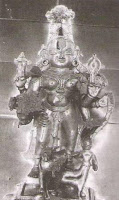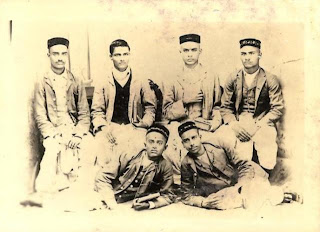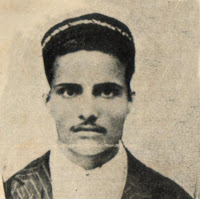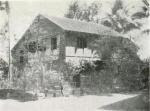ये मृत्यो! ये तूं ये, यावयाप्रती
निघालाचि असशिल जरि ये तरी सुखें!
कोमेजुनि जावया भिवोत हीं फुलें
हीं द्राक्षें रसरशींत सुकुनि जावया
भ्यावें तें का म्हणुनी तुजसि परी मी?
माझ्या पेल्यांत किती पीत राहिलों
तरी न संपतीच अशा असति आजि ह्या
अश्रूंच्या मदिराची मात्र राहिल्या !
ये, त्या जरि नैवेद्या अससि भुकेला
आणि जरी दिवस असे अजुनि तरुण हा
तरि लहानथोर अशीं असति संपलीं
दिवसाचीं कार्येंही बहुतकरूनिया,
तोडजोड करूनि परी फेडलीं ऋणें
जन्मार्जित जीं जीं तीं, ऋषिऋणाप्रती
श्रुतिजननीचरणतीर्थ सेवुनी कधीं,
धरुनि कधी धृवपदांसि संत-तीच्या
आशेच्या या स्मशानभूंत तपस्या
देवऋणा, फुंकुनि रणशृंग , दुंदुभी
धडड धडड पिटुनि, आणि तो आघाडिचा
चढवुनिनि तैं हल्ला सहसाचि ज्या पलीं
सुटली राघुवीराची प्रथम रणाज्ञा
आणि त्याचि रणयज्ञाग्नींत अग्नीं पेटल्या
अस्थि अस्थि, मांस मांस, इन्धनें तशीं
जळत जळत आज असे शेष राहिली
राख यौवनाची मम! आणि म्हणुनिची
फेडाया पितृऋणासि आजि अहो मी
शास्त्रातें अनुसरोनि दत्तविधानें,
निपुत्रिकत्वा वारियलें:पुत्र अखिल हें
अभिनव भारतची मम! जेथ जेथ कीं
पाळण्यांत विकसतसे नयन-कमल तें
तेथे तेथे मीच बघें सृष्टी-कुतुहला.
नव उन्नति शील भालपटलिं दिसत जैं
उदयोन्मुख तेज तरुण, तैं पुनः पुन्हा
माझ्याही उदयोन्मुख होति हृदिं या
आशा नव, आकांक्षा उच्च, भावि त्या
आमुचिया वंशाच्या गौरवाचिया-
वंशाच्या गौरवार्थ ! अखिल मानवी
यौवनांत अनुभवीन यौवनास मी
आणि पितर माझे ते प्रेमतर्पणा !
येइं सुखें मृत्यो, तरी – असति हीं अशीं,
तडजोड करूनि परी फेडिली ऋणें,
आणि बहुतकरुनीया असति संपलीं
दिवसाचीं कार्येंही : यद्यपि कधीं
उगवे हा दिवस, कधीं मावळेहि वा,
कर्में वा कवण, कशीं कार्य, या दिनीं
याविषयीं पंचांगें भिन्न, भिन्नची
भट्ट आणि पण्डित हे कथिति मज कथा,
तरिहि लोकसंग्रहार्थ, धरणाप्रती
मानवीय आत्यंतिक आत्महिताच्या,
सज्जनासि गमलीं अनुकूल तींच कीं
कार्यें म्यां धर्म्य अशीं मानिलीं अणी
तदनुरूप एकाचा म्हणूनि जो ठरे
म्यां माझा भार असे अचलिला मुदें
यथाशक्ति यथापरिस्थिति न भंगितां
धरिलें तें व्रत कदापि किमपि ना भयें.
सत्कुल, अव्यंग देह, परम दयाळू
जनक आणि जननी ती, त्यांहुनीहि कीं
वात्सल्यें, पुण्यें, प्रतिपाळिता तसा
अग्रज, जो अग्रगण्य तापसांमधें;
मूर्त विनय अनुज असा; अद्वितीयसें
प्रेयांचें प्रेमपुण्य; धन्य आणि तें
ध्येय महत्, देई जें जीवनाप्रती
सार्थकत्व मानुजांच्या, काव्यमय करी
जें आयुःकालातें, पूत चरित्रा;
तप कांहीं, जप कांहीं, यश कांहीं तें
कांहींशी मान्यताहि शारदेचिया
चाखियले रस नाना; हुंगियले ते
शतभूजलवायुललित शतसुगंध कीं
पंचाग्नीमधिल तया प्रखर भाजत्या
उत्तापापासुनि तों प्रीतिच्या मऊ
स्निग्ध परिश्वंगापर्यंत सर्वही
शीतल, शीतोष्ण, उष्ण अनुभवयीले
कटिबंधस्पर्श तसें; परिसिले किती
स्वरशत, शतभाषा, शतगीति नवनवा
शतमंजुल कंठांतिल- आणि मृत्यूच्या
शतकठोर कंठांतिल घोर लागल्या,
नाना जन, जानपदें, जातिविभिन्ना
देश किती दृश्यें तीं, भूमिच्या महा-
संग्रहालयांत परिभ्रमत पहिलीं.
सुरूप तें, सुरेख तें, सुललित तें असें
पाहियलें डोळ्यांनी किमपि तरि जया
मृत्यो! ते डोळे हे झांक तूं सुखें !
- झांकणेंचि आवश्यक जरि गमे तरी!
कीं सुरेख पाहियलें - किमपि परी तें !
प्रीति विपल: विरह चिरंतन! नवीं वयीं,
प्रौढ धुरंधरहि न जी शकति तोलण्या,
तीच धुरा भर उन्हांत तोळणें घडे !
म्हणुनि असे अजुनी अपुरीच राहिली
खेळाची हौस हंसत चांदण्यामधें
या आयुष्याच्या मम! तरिहि जाणुनी
कीं न ययातीचीहि हौस पुरेशी
झाली जरि आयुष्याचाचि सर्व तो
नृपति करी खेळ एक; आणि पाहुनी
इच्छेच्या बीजा फल भोग लागतां
इच्छेचीं बीजेंची त्यांत फिरोनी;
आणी अनुभवुनी कीं एक भुकेची
एक जेवणानें जी तृप्ति जाहली
तृप्ति सहस्त्राव्याही भोजनामुळें
असतें कीं तीतुकीची आणि तशीची;
-मी दे तुज अनुमोदन संपवूं असा
हा जीवनलेख इथें; पृष्ठिं या जरी
पृष्ठें जीं पुढलीं तीं मागल्या तया
पृष्ठांची असली पुनरुक्तिची तरी !
म्यां असतां दिवस नसे व्यर्थ गमविला
दिवसास्ताचेंहि म्हणुनि दुःख ना मला.
-भीति उद्यांची ही वा! मृत्युच्या मृता
जरि असेल त्या अंधःकार-लतेला
फुलत दुज्या दिवसाचें फुल तरीही
भीति न मज; कीं येथें पेरिलें आम्हीं
फुलत आणि फलत तेंच , कथिति ते तिथें.
आणी मी पेराया कष्टलों असें
बीजें कीं तीं जीं निवडुनी दिलीं
त्यांनींची अत्युत्तम म्हणुनिया मला
पेरुं फलाशाविरहित. ‘ तूं तसें जरी
वर्ततील समरपरिस्थितींत अन्यही ;
तरि लोकोन्नति-विनाश होय ना असें
वर्त’ तसेंची वर्तूं यत्न म्यां सदा
केला आबाल्य “जसें अन्य तुझ्याशीं
वागावें म्हणुनि तुला वाटतें तसें
तूहिं वाग अन्याशीं” संतवचन हें
मी अनुपलिं पालाया कष्टलों अणी
जरि आपद्धर्म सेव्य मानिले तरी
ते इतुक्यास्तवची कीं धर्मची स्वयें
ओपुनि दे आपत्तीच्याचि मज करीं !
जैं हिरव्या गवताचा गार गालिचा –
वरुनि दहापावलीच अंगणामधें
कारागारांत कधीं मी फिरें तधीं
आत्मौपम्यांत मुरत चित्त थिजोनी
कितिदां तरि चरण अकस्मांत चालतां
स्तंभित होऊनी रहावेत घटिघटी
कांहीं केल्याहि तया तरुण कोंवळ्या
गवताचे अंकुर दुखतील या भयें
पाय त्यांवरी नये पडूंचि कीं पुढें
हातींचा घास कधीं हटुनि रहावा
हातींची, कीं जितुकीं त्यांत शितें तीं
बिजेंची नव्हत काय ? खातसों अम्ही
फल तें तें भृणघात ? आणि कधिंकधीं
मज पडलें भय कीं मज वेड लागलें !
आत्मौपम्यांस जईं वर्तण्यांत हें
मन माझें अनुसरितां मज पदोपदीं
मरणासम दुःख होय पाहुनी जगीं
पूर्ण असंभवचि तया आचरुं पुरें
तरिही यत्न म्यां केला; अज्ञतेमुळें
वा अशक्यतेमुळेंच पद कधीं जरी
स्खलित जाहलें असले तरि असले तें
म्हणुनि भय अद्यांही ना स्मशामभूमिचा
परतटप्रदेश जो अनोळखी तिथें
सुखकर प्रवास करवि जें असें असे
ओळखिचें पत्र आम्हांजवळ त्या स्वयें
भगवान श्रीकृष्णचें-श्रीमंतां गृहे
शुचीनां च! बा गेहे योगिनामपि
‘कश्चित् कल्याणकृच्च तात दुर्गतिम्
नहि गच्छति ‘ नहि गच्छति सांगती अणी
ते निरीश्वर-स्वभाव-वादिही मला;
म्हणुनि जरी सत्यचि जें वदति ते, जरी
स्वर्ग, नरक जन्मान्तर, बंध मुक्ति वा
निजकर्माचाची परिपाक कीं तरी
त्या अदृष्ट नगरांतील अति सुरम्य ते
राखवुनि ठेवियले असति बंगले
अधींची आम्हांस्तव भरूनिया अम्ही
कर्माच्या, धर्माच्या नियत विसारा !
परि जरी कीं स्वर्ग, जीव, बंध, कर्म वा
ऐहिक तें इन्द्रजाल मात्र, कीं जरी
संघातोत्पन्न भाव मात्र जीव हा
मृत्युपृथक्करणिं अभावांत ओसरे
तरि सर्वोत्तमचि! मरण एक सुषुप्ति
अथवा प्रत्यक्ष मुक्ति! पंचही असे
मिश्रित भूतांश पृथक् मुक्त होउनी
विहरोत स्वेच्छ नव्या मिश्रणांतुनी,
वा स्वयेंचि, वा शून्यीं ! इंद्रधनु तसें
संज्ञेच्या आकाशीं विपल शोभुनी
विपलांतचि हा माझा ’मी‘ हि कीं जरी
विश्वाच्या अंतर्हित ’मी‘ त मावळे
तरि मरणा! मरण न तूं! मरण मुक्तिची!
–विपलांतचि परि! विनंती इतुकिची असे:
येणे तरि येउनि जा झटकनी तुझा
दुर्लौकिक जो जगांत, लोक जो तुझा
द्वेष करिति, तो नचि कीं अससि तूं स्वतः
निर्दय वा निंद्य म्हणुनि-पाहुनी तुला
अलाची कोणीही परत कीं न तो
सांगूं तूं केंवी तें! -परि विशेषतः
मृत्यो! तूं अप्रियसा जगतिं जें तुझें
सैन्य, पुरस्सर, पीडक हें हिडिस्ससें,
रोगाचें क्रुर असे, त्यामुळेंच कीं !
मीच न कीं परि अजातशत्रू जो जगीं,
तुल्य ज्या प्रियप्रियादि हानि, लाभ, त्या
भगवान् श्रीगौतमाप्रतीहि भासला
रोग जरा अप्रियचि: ‘लाभ ना दुजा
आरोग्यासम जगतीं’ धर्मपद वदे
तरिही जे कोणी तुज नुघडतीलची
स्वेच्छेनें दरवाजे, दुर्ग ते हठी
जिंकुं जीवनाचे तूं धाड धाडही
रोगांच्या सैन्याची गांजत्या तिथें.
मीं तों जीं नुघडतील फोडिलीं तरी
जाणारचि, तीं दारें उघडुनी स्वयें
या माझ्या गेहाचीं, स्वागता असे
अनिवार्या सिद्ध तुझ्या! म्हणुनि शक्य कीं
ये तरि, हे अखिल-वीर-वीर-विजेत्या !
एकलाचि, अपुरस्सर, आणि अकस्मात
परि अशक्य जरि तें तुज एकटें तसें
येणेंची, तरि त्याही क्रुर पीडका
रोगाच्या सैन्याचा क्षोभ सोसण्या
मी असेंचि सिद्ध आजि दोन वत्सरें
पाह्तची अससी तूं मजसि हा असा
शरपंजरिं खिळला! ज्या मधुर लागलें
जीवनांतलें मधु, प्रकाश चक्षुतें,
प्रीति हृदा तो मी त्या सर्व सुखांचे
मूल्य म्हणुनि मृत्युच्या यातनाहि कीं
समजुनि कर्तव्य सहूं सिद्ध असेंची !
|
Come, O Death, come! Having set forth
To get me, gladly come you may!
Let these flowers fear to wither and die,
Let these juicy grapes dread to shrivel and die,
But me! Why pray should I fear you?
Sip and sip did I from the Cup of Life,
Yet it is finished not today,
The Wine of Tears but remains.
Come, hungry as you are for this oblation,
Though the day is still so young,
Big or small, as be the deeds of the day
Accomplished they mostly are.
Compromise it took to pay off those debts
Acquired from birth; the Debt of the Sages
I paid by sometimes imbibing the Sacred Water
That washed the feet of Shruti, the Mother Vedas,
And sometimes by following the path of various Saints
And also by practicing penance of hopes for an age
These crematory austerities being for the Debt of Gods—
Sounding the War Trumpet, pounding the drums forcefully,
Swift and sudden was the frontal attack
The instant the first battle order Shri Ram issued
And in that Sacrificial War, an inferno was set ablaze
Bone and bone, flesh and flesh fuel to it became—
Just so too, reduced to ashes is my youth! And so,
To discharge the debt I owe to my Ancestors,
Abiding with the Scriptures of Adoption,
That I may not die without an heir, all these sons
Of Abhinav Bharat I take to be as my own! Wherever
The Lotus-eyed One blooms in a crib,
There I am marveling the wonder of creation.
Whither fresh talent, strong character mark the brows,
Thither, new brilliance rises again and again!
Fresh hopes and high aspirations—for the future
Glory of our Lineage, not just that of India,
But for the glory of Humanity!
In this very Youth of all Humanity,
Shall I relive my own Youth
And so shall my ancestors
To whom I lovingly offer oblations!
Come, O Death, gladly come then—
Such are the debts, paid off one way or another,
And most are likely accomplished.
There are deeds of the day: even though
For when the day dawns, when it shall set,
What are the duties, what the deeds,
Many are the opinions given by
Various tomes, priests, and scholars—
For uniting people, for the Essence
Of the welfare of humanity,
Deeds that the Noble Ones found to be fitting,
Only such deeds did I consider to be righteous,
Accordingly is ordained a burden to each one
And joyously have I borne mine
Ability and circumstance notwithstanding,
Ever true to my Oath have I been
Untainted by the slightest trace of fear.
Of noble family my parents were,
With faultless figures, and ever so kind of heart.
My elder brother, foremost amongst the Yogis,
Raised me so honorably, with such loving care;
My younger brother, Epitome of Modesty he is;
Unparalleled is this love; blessed am I
And that glorious goal, that gives to human life
Significance, that renders poetic my lifespan,
That sanctifies my character;
Some penance, some chanting—
With a measure of success, some shining
In Sharda’s Court with Gems among poets.
Savored many a juice of fruits; breathed in
Hundreds of fragrances wafting with the breezes
Over hundreds of lands and waters,
The heat of the raging five fires,
To love’s sweet, soft embrace—cool, hot, sultry—
All experienced like the encircling of a belt;
Heard hundreds of tunes and languages,
Hundreds of songs, new and newer,
From hundreds of melodious throats,
And Death’s terrible roars from a very harsh throat.
Many people, villages, all kinds of countries,
Meandering the Museum of this Earth;
So beautiful, so distinctive, so entertaining,
Such sights seen with the eyes—
O Death! Gladly close these eyes you may!
If you deem it necessary to close so!
For I have seen beauty—a little perhaps!
Love for but a moment, a separation for eternity!
That which seasoned stalwarts cannot endure,
Those very yokes in the sweltering sun,
Such I endured in my youth!
So still unfulfilled in this life of mine
Is desire to frolic in the starlight—
But knowing: slaked not were the yearnings
Of Yayati—no, not e’en a lifetime of fun
Did satisfy the king. And seeing:
Deeds of Desire bear Fruit of Enjoyment,
And lo!—more seeds of desire flow;
Also, experiencing: an appetite
Is as replete by a single meal
As by the thousandth such meal—
O Death! I give you leave to end
The script of my life here.
The pages to come were perhaps to be
But a repetition of the pages past!
Squandered not I even a moment of my life,
So the day’s end brings no sorrow to me.
Mortals do so fear the death on the morrow!
But even in the darkness, a new flower blooms
To a creeper for the next day.
Fear not I, for what we sow here today
That is what blooms and bears fruit, so they say.
And with hardship did I sow such seeds
Exquisite, chosen, given to me to sow
Without expectation of fruit, saying to me
“As you behave, others shall in wartime, adversity;
Behave that no harm shall be brought
Upon the Progress of Humanity.”
That behavior I always aspired to from childhood,
“Behave unto others as you wish them
To behave toward you,” say the saints.
I took trouble to follow this every moment,
Even in distress it served me well—
Just that dharma itself offered calamities to me!
Whenever I pace in the narrow prison-yard
Upon the cool, green carpet of grass, then
Absorbed in introspection my mind froze,
Suddenly legs turned to pillars—unmoving!
The fear that the next step shall
Crush the young, tender grass sprouts
Stayed my feet in their spot.
At times, the morsel in my hand
These grains I hold are they not seeds?
Does not eating the fruits abort the embryos?
Sometimes, when such forebodings were mine,
How I feared that I was losing my mind!
My mind, following me at every step,
Is awake to the profound grief in this world.
To conquer this totally is perhaps impossible,
Effort I did make. P’haps powerless or
Unaware my feet may have stumbled,
But fear not I today the unknown
In the alien territory of the crematory,
To ease such travel in this land,
A letter of introduction I have from
Lord Krishna himself—to the rich,
The pure, and the house of yogis.
One of noble deeds never attains
Misfortune in his rebirth, so say
The learned rishis to me;
If one believes there is truth in that,
Heaven, hell, rebirth, captivity, or moksha
All are but the consequence of one’s deeds.
So where the Door of Death shall open,
In that unseen City of Beauty,
The house is reserved for us
Pre-determined by the down payment
paid by our many deeds and duties.
If we believe heaven, soul, fetters, or fate
Are but a figment of our imagination,
And the Soul only an illusion created post-death,
Then death by that analysis is non-existent.
Wonderful! Death is just a deep sleep
Or mukti itself! The five such elements[2]
That were combined with release
Wander at will bonded anew,
Or as themselves, or as nothing!
Just like the momentary glory of the rainbow,
The “I” in me has a moment of glory
In the Sky of Consciousness, though
Fated to set in the Universe unknown.
So, Death! End you are not!—only a release!
That in moments! Only request is,
If on your way you are, delay not!
Your notoriety in this world, hatred you are held in
It is not because you are cruel or condemnable—
No one ever returned after seeing you
That they could give a report!
Especially, O Death! You gain unpopularity
In this world, by the army preceding you—
That hideous menace of cruel diseases!
Not just I, but even one with no enemy in the world,
Has his share of love and hate, loss and gain.
Gautama Buddha himself realized disease is hateful.
“No gain like good health in this world,” says the Dharmapad.
Even so, for those who will not welcome you willingly,
Or the stubborn ones who conquer the battles of life, Troublesome Armies of Disease you send to them!
Break my unwilling doors, but taken from my house
I shall be only when I open the doors myself—
Your welcome here is incontrovertibly proven,
So it is feasible for you to come,
O Conqueror of All Heroes!
Alone, without surprise, not leading your army,
If impossible it is for you to come so—
No matter, I am prepared the past two years
To withstand the wrath of your pitiless Army of Disease!
You must certainly have seen me thus,
Lying on the bed of arrows! He who found in life
Sweetness of honey in life, light to brighten the eyes,
And love for the heart—that is me!
As a price for all that happiness,
I am prepared to endure the torments of death,
|






